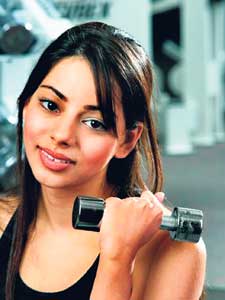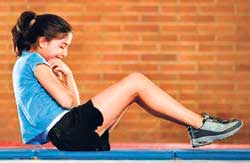Fitness tips
It seems fewer and fewer young people are interested in playing sport or getting involved in other physical activities - and there's a battery of excuses for avoiding it. It's true the thought of exercise doesn't make everyone jump for joy, but no one was born with a 'rubbish-at-sport' gene so, however hopeless you think you are, there's an activity out there to suit you.
The excuses
-
"It's not cool." Try telling David Beckham or Tendulkar. All right, we can't all reach the very top, but we can all get a lot out of being fitter. People who tell you it's not cool are usually the ones who couldn't run to catch a bus if their lives depended on it.
n "None of my friends or family does it." Be a trailblazer. They might be inspired by your example. If your friends and family make fun of fit folk it might actually be because they're jealous.
-
"It's a boy thing." It's true more boys than girls do exercise, but that's not because girls are rubbish at sport. Many girls don't find the activities at school suit them, but there are things to try outside school, such as dance or martial arts.
-
"It's sore/uncomfortable/sweaty." It should never be sore for long, or uncomfortable, and feeling a bit stiff after activity is natural. Yes, activity does make you sweat, but if you're enjoying yourself you probably won't notice - and everyone else gets sweaty too.
-
"I don't want muscles." Being fit and having bulging muscles don't necessarily go together. To get big muscles you have to do a programme of specific exercises.
-
"I'm overweight/skinny/have a disability." Don't worry about what you think you look like - get in there and enjoy yourself. If you're genuinely very overweight, not just a stone or less, talk to your doctor and tell them what you want to do. If you've got a disability, don't let yourself be cut out of the action - getting fit benefits everyone.
-
"I don't like joining in/teams." Fine. If teams leave you cold, check out activities you can do by yourself or with a friend.
-
"I'd rather play with the computer/watch TV/talk to my mates." It doesn't have to be either/or - you can do both.
Once you've got over worrying about looking daft or getting sweaty, think about all the positive reasons for being physically active.
Apart from the health benefits people of all ages get from exercise, it's also an opportunity to meet up with friends or make new ones, it can provide a fun break from the stresses of school and exams, and it can give you a real sense of achievement - you never know, you might discover a talent you never knew you had.
School sports
Some people are particularly uncomfortable about sport and exercise at school. If that's the case for you, try these steps to resolve the problem:
-
Talk to the teacher concerned on the quiet, if you can, and explain what's bothering you. Teachers are there to encourage you into doing more than you think you can. If you really can't, then say so.
-
If a particular sport or activity is a nightmare, ask if there's something else you could do instead. Come up with some suggestions so it's clear you're being helpful rather than just trying to get out of it.
-
If you're worried about what you look like, talk to your teacher. Ask if it's possible to wear tracksuit bottoms or baggy clothing if you're worried about your weight, for example.
-
If periods are a problem, talk to the teacher (or a female teacher if your PE teacher is male). Exercise often helps with period pain once you start, but if they're particularly bad, ask to sit out.
How much exercise do I need?
The government recommends that children and young people get one hour of physical activity a day.
This activity should be of at least moderate intensity - in other words, you should work up a bit of a sweat and get slightly out of breath. But if you can manage something a bit more strenuous, then that's even better.
At least twice a week you should include activities to improve bone health, muscle strength and flexibility. Activities that are 'weight bearing' (in other words, where you are on your feet, rather than in water or on a bike) help build strong bones.
By 2008, the government hopes to have 85 per cent of young people aged five to 16 spending at least two hours a week on high-quality PE and school sport, both during the school day and afterwards. It says by 2010 it aims to have all schoolchildren doing twice that much.
But a report by medical experts, published in medical magazine The Lancet last year, says even an hour's activity a day, which most young people don't achieve, isn't enough. If you want to avoid heart disease and obesity, you need to do 90 minutes exercise a day, experts say.
- www.bbc.co.uk |


